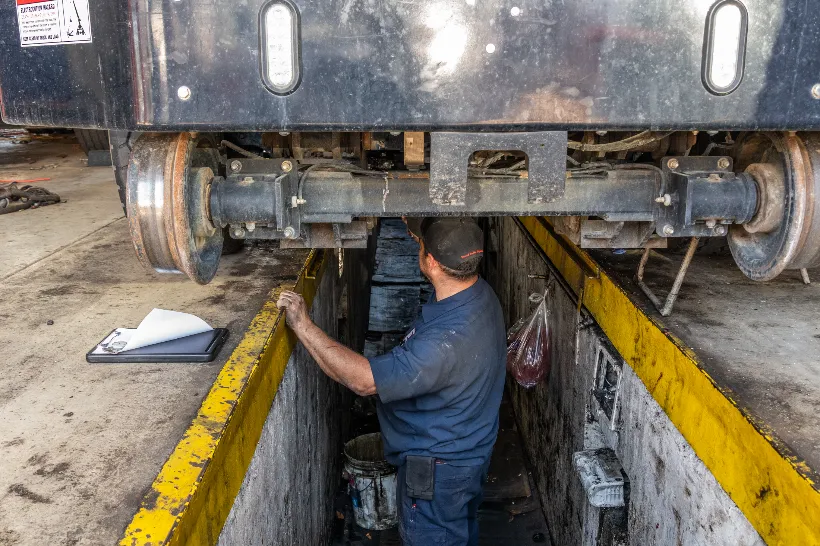My Check Engine Light Has Come On, Now What?

Is there anything more horrifying than seeing your check engine light flash up on your dashboard? It may be tempting to dismiss this and keep on driving, but this little warning can save you a huge headache down the road. Here’s a step-by-step guide tailored to make sure you stay ahead of potential issues.
Understanding the Check Engine Light
The check engine light, or Malfunction Indicator Lamp (MIL), is part of your vehicle’s onboard diagnostics system (OBD). It monitors engine performance, emissions, and key systems. When this light activates, your truck’s OBD has detected something outside normal parameters.
Common Reasons for a Check Engine Light
- Loose or Faulty Gas Cap
A loose gas cap may seem trivial, but it affects fuel system pressure and emissions.
Action: Tighten the cap or replace it if damaged. - Faulty Oxygen Sensor (O2 Sensor)
This sensor monitors exhaust gases to optimize the air-fuel mixture. A faulty sensor can lead to poor fuel economy.
Action: Replace the sensor promptly to avoid damaging the catalytic converter. - Worn Spark Plugs or Ignition Coils
These components ensure proper combustion in the engine. Their failure may cause misfires and reduce performance.
Action: Inspect and replace faulty plugs or coils. - Malfunctioning Diesel Particulate Filter (DPF)
For heavy-duty diesel engines, a clogged DPF can trigger the light. This issue arises if the regeneration process fails.
Action: Perform a manual or forced regeneration. - Mass Airflow Sensor Problems
This sensor measures the air entering the engine. If faulty, it disrupts fuel delivery, causing rough performance.
Action: Clean or replace the sensor.
What To Do When the Light Comes On
1. Don’t Panic
While the check engine light is serious, it doesn’t always mean immediate disaster. Gauge the urgency by noting how your vehicle is performing. Is it running rough, stalling, or emitting unusual sounds?
If so, it’s best to stop driving immediately
2. Check for Obvious Issues
Inspect the fuel cap, listen for misfires, and watch for smoke or strange smells. Minor issues can sometimes be resolved without professional help.
3. Pay Attention to the Light’s Behavior
- Steady Light: Indicates a non-urgent problem, such as a minor emissions issue.
- Flashing Light: Signals are a severe issue, often related to misfires, which can damage the catalytic converter or engine. Stop driving immediately.
4. Use an OBD-II Scanner
If you can access an OBD-II scanner, it can quickly read the trouble codes causing the warning. The codes are key to pinpointing the issue. Common trouble codes include:
- P0171: System Too Lean
- P0300: Random/Multiple Cylinder Misfire
- P0420: Catalyst System Efficiency Below Threshold
When to Seek Professional Help
If troubleshooting doesn’t resolve the issue, or you lack diagnostic tools, it’s time to visit a trusted diesel repair specialist. Skilled mechanics can interpret OBD codes, inspect critical systems, and ensure no underlying damage is overlooked.
Tip for Chicago Operators: Given harsh winters, components like glow plugs, air filters, and the EGR system often need extra attention.
How to Avoid Check Engine Light Issues
Preventive maintenance is the key to minimizing surprises. Follow these steps:
- Routine Inspections: Regularly check your diesel engine’s DPF, catalytic converter, and fluid levels.
- Keep Filters Clean: Dirty air and fuel filters strain the engine.
- Address Small Issues Quickly: Ignoring minor problems often leads to more significant repairs.
- Monitor Coolant and Oil Levels: These are critical for engine longevity.
- Stay Emissions Compliant: Avoid tampering with systems like the SCR or DPF.
Recap
A check engine light is your truck’s way of calling for help. You can save yourself from costly downtime or extensive repairs by acting quickly and methodically. Remember, staying ahead with preventive maintenance ensures your diesel engine delivers peak performance.
Similar posts
.webp)
7 Fleet Maintenance Tasks That Can’t Be Skipped
Fleet downtime is costly—and avoidable. From oil changes and brake checks to aftertreatment upkeep and tire care, these seven maintenance tasks are essential to keep your fleet running strong. In Chicago’s tough conditions, preventive maintenance isn’t optional—it’s survival.

5 Fleet Maintenance Mistakes That Are Draining Your Budget—and How to Fix Them
Fleet maintenance mistakes cost more than downtime—they bleed your budget. From skipped inspections to poor recordkeeping, tire mismanagement, and cheap fixes, here are five costly errors and how to avoid them. Protect your trucks and your bottom line.
